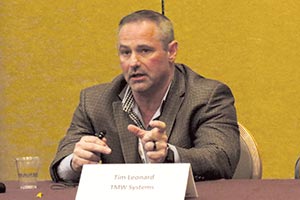Carriers Must Leverage Technology, Data to Improve Profitability, Supplier Execs Say

This story appears in the Oct. 17 print edition of Transport Topics.
LAS VEGAS — More trucking companies will become efficient and profitable if they embrace new technology and “big data” analysis of industry trends, two technology executives told an audience here Oct. 4 at American Trucking Associations’ Management Conference & Exhibition.
Timothy Leonard, chief technology officer at TMW Systems, said data across the industry is inconsistent, which hinders the ability to analyze trends and offer insight to trucking companies. Russell Jones, CEO of Cargo Chief, added that many small- and medium-size motor carriers use plain text or Excel spreadsheets to manage their fleets, resulting in unused truck capacity not being disclosed publicly to match with available loads.
The two companies are among many that hope to tie the future of freight management to smartphones, tablets and data analytics.
“We’re at a very interesting tipping point in the industry. Never before has the freight industry faced so much pressure to embrace technology, especially as [venture capitalists] have poured billions into startups,” Richard Metzler, chief marketing officer at online shipping marketplace uShip, said in a separate interview.
TMW and Cargo Chief advocated for data sharing, but argued that data formatting must be uniform.
For example, Leonard said carriers and third-party logistics firms have entered Freightliner Trucks and its address more than 170 different ways into transportation management systems. Some wrote “Freightliner,” while others used “Freightliner Trucks” or abbreviated Freightliner into various formats.
For company headquarters, maintenance shops or distribution centers, some wrote out “road” or “lane,” while others abbreviated them. The cities and ZIP codes also were inconsistent.
TMW Systems, which is part of Trimble Navigation Ltd., hopes to bridge the gap with a unified system of a single name and address to cleanse client records into a standard format. Leonard said the goal would be to answer questions that were impossible before.
“The engines of X make and model perform like Y in what situation? Tractors manufactured between years 1 and 3 at plant Z tended to do what?” he said. Leonard added that such answers would help improve asset availability for trucking companies.
Jones told the trucking executives that smaller carriers often don’t advertise or market their capacity, whereas larger carriers easily work with the freight brokers to book available loads. Many small carriers use dry-erase boards and about 90% don’t use transportation management systems, he added. They also face stiff competition on popular load boards.
Trucking is a highly fragmented industry, with the top 25 truckload carriers operating fewer than 9% of the industry’s tractors, according to American Trucking Associations.
“So how do we capture this capacity to the industry that’s been locked for decades? How we do it is with a cloud-based TMS that enables the capacity of these small carriers to finally be seen,” Jones said. He said the technology also would help large and small freight brokers better match loads for clients.
Jones touted Cargo Chief as simple to use, without upfront costs or high monthly fees. In order to be successful, he added that carriers would have to see a return on their investments within a few months.
During a question-and-answer session, representatives from larger carriers asked whether Cargo Chief was a competitive advantage or disadvantage for them.
“As long as the large carriers are open to new technologies and have a culture in the corporation to experiment with new things, not just doing the same thing over and over, they will continue to enjoy an overall lead. Those that say they’re not going to change are going to have some issues,” Jones responded.
But uShip’s Metzler warned that trucking executives must embrace technology for the right reasons, not for the hype or seduction.
He said many freight startups are simply brokers in disguise, while on-demand startups “have zero route density or revenue per stop — the only two ways that logistics economics work.”
“The technology that wins scales within an existing company’s operation, helps automate freight movement, turns pricing more transparent and aggregates qualified, fragmented capacity,” Metzler said.

